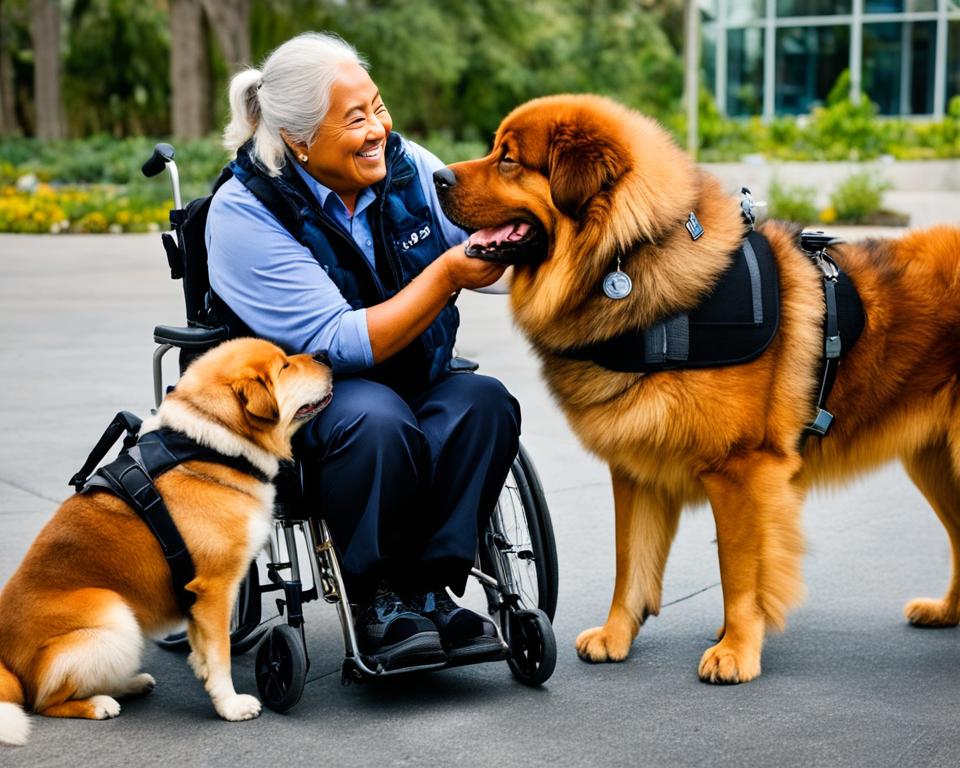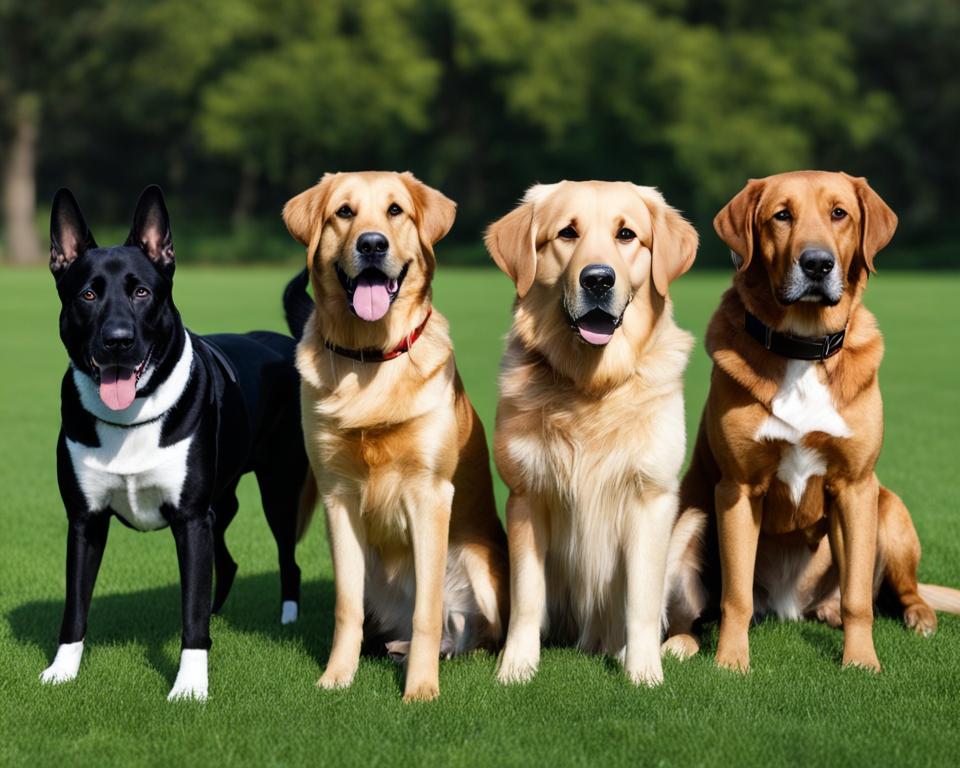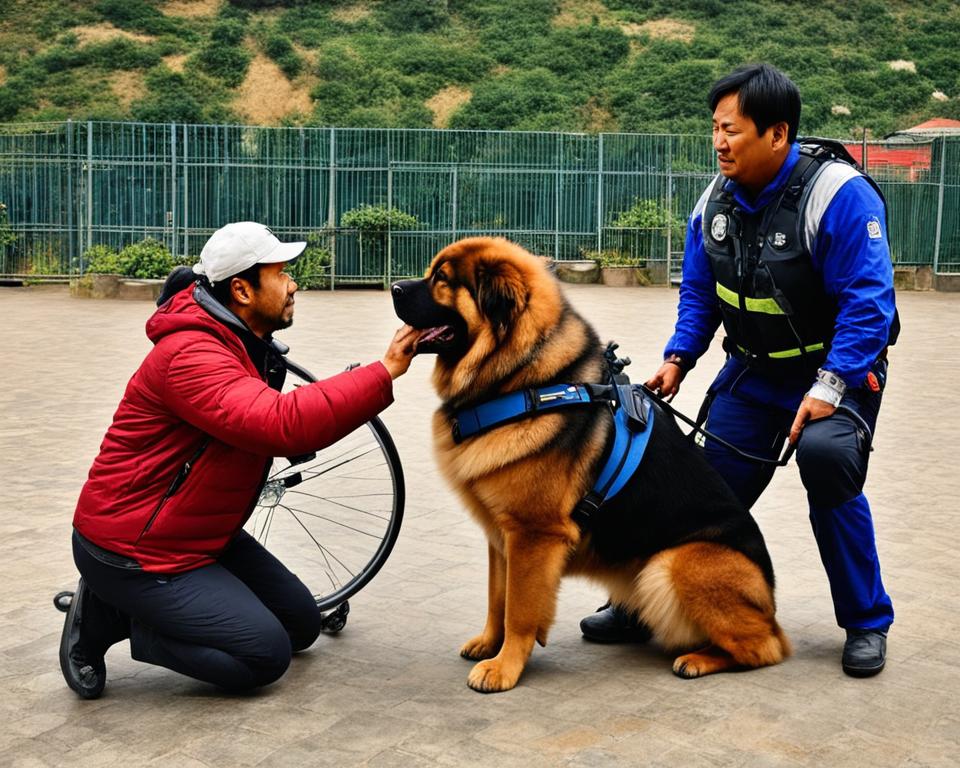Tibetan Mastiffs are increasingly being recognized for their role as service dogs, providing invaluable assistance to individuals with disabilities. These majestic and gentle creatures can be trained to assist people in a variety of settings, including private homes, group homes, and group living situations. Through Animal Assisted Therapy, Tibetan Mastiffs help promote independence and self-care by teaching responsibility and self-confidence to their handlers.
One of the remarkable qualities of Tibetan Mastiffs is their unconditional love and unwavering loyalty to their owners. These dogs excel at providing emotional support, promoting inclusion, and helping individuals in social interactions. Their intelligence, gentleness, fearlessness, and strong devotion make them ideal companions in various settings.
Tibetan Mastiffs also serve as therapy dogs in hospitals, rehabilitation centers, and nursing homes. Their calm and stable temperament make them well-suited for this role, enhancing traditional treatment modalities and making a positive impact on patients’ lives.
- Tibetan Mastiffs can be trained as service dogs to assist individuals with disabilities.
- They play a significant role in promoting independence and self-care.
- These gentle giants provide unconditional love and enhance social interactions.
- Tibetan Mastiffs are also well-suited to serve as therapy dogs in healthcare settings.
- Their calm and stable temperament make them ideal for enhancing traditional treatment modalities.
The Role of Tibetan Mastiffs as Therapy Dogs
Tibetan Mastiffs possess the ideal characteristics for serving as therapy dogs. Their gentle nature, stable temperament, and high intelligence make them highly suitable for this role. They are trained to work in various environments, including hospitals and healthcare settings, where they can enhance traditional treatment modalities.
These therapy dogs are adept at working around medical equipment, loud noises, and other distractions that may be present during therapy sessions. Their ability to remain calm and focused in these situations allows them to provide comfort and support to patients.
Tibetan Mastiffs not only enjoy the interaction with individuals during therapy sessions but also have a positive impact on patients’ lives. Their presence and companionship help reduce stress, anxiety, and feelings of loneliness. These therapy dogs are able to establish a deep connection with those in need, making them valuable assets in the healing process.
Private training classes are available to prepare Tibetan Mastiffs for therapy dog testing and certification. These classes focus on honing the dogs’ existing skills and behaviors, ensuring they meet the specific requirements to become trusted therapy dogs.
| Role of Tibetan Mastiffs as Therapy Dogs | |
|---|---|
| Traits and Characteristics | Benefits and Effects |
| Gentle nature | Reduces stress and anxiety |
| Stable temperament | Provides comfort and support |
| High intelligence | Enhances traditional treatment modalities |
| Establishes emotional connections with patients |
Tibetan Mastiffs serve as both therapeutic companions and reliable working dogs. Their remarkable traits and abilities make them an invaluable asset in the field of therapy and animal-assisted interventions.
Tibetan Mastiffs as Service Dogs for Specific Disabilities
Tibetan Mastiffs have proven to be exceptional service dogs for individuals with various disabilities. Their unique characteristics and temperament make them well-suited for specific roles in assisting people with different needs.
1. Mobility Dogs
Tibetan Mastiffs are highly capable as mobility dogs, particularly for individuals who use wheelchairs. With their large size and strong build, they possess the necessary strength to pull wheelchairs and provide stability to their handlers.
2. Assistance for PTSD, Anxiety, and Depression
Tibetan Mastiffs are also well-suited as service dogs for individuals dealing with PTSD, anxiety, and depression. These dogs form a close bond with their handlers and offer a sense of security and comfort during times of emotional distress. Their protective nature and unconditional love can significantly alleviate symptoms and provide reassurance.
3. Medical Condition Assistance
Tibetan Mastiffs can be trained to assist individuals with specific medical conditions, further highlighting their versatility as service dogs. They can detect changes in blood sugar or insulin levels, making them valuable companions for people with diabetes. Additionally, these dogs can provide support and assistance during seizures for individuals with seizure disorders. Their acute hearing also enables them to detect sounds that individuals with hearing impairments may miss.
Benefits of Tibetan Mastiffs as Service Dogs
- Large size and strong build for mobility assistance
- Close bond and protective nature for emotional support
- Ability to detect changes in blood sugar, insulin levels, and sounds
- Alertness and responsiveness to specific medical conditions
Comparison of Service Dog Breeds
| Breed | Size | Temperament | Training Difficulty |
|---|---|---|---|
| Tibetan Mastiff | Large | Gentle, Protective | Intermediate |
| Labrador Retriever | Medium to Large | Friendly, Eager to Please | Easy |
| Golden Retriever | Medium to Large | Friendly, Intelligent | Easy |
| German Shepherd | Medium to Large | Loyal, Intelligent | Intermediate |
As seen in the comparison table above, Tibetan Mastiffs offer unique benefits as service dogs for specific disabilities. Their gentle and protective nature, coupled with their training adaptability, make them an excellent choice for individuals in need of assistance and support.
Next, we will explore the qualities to consider when selecting a service dog.

Qualities to Look for in a Service Dog
Selecting the right service dog is crucial when considering a canine companion to assist individuals with disabilities. When searching for a service dog, it is essential to prioritize specific qualities to ensure their effectiveness in meeting the individual’s needs. Service dog breeds vary, but certain qualities are universally important. Here are some key service dog qualities to consider:
- Eager to please: A service dog should have an innate desire to please their handler and serve their needs.
- Intelligent: Intelligence is crucial for a service dog, as they need to understand and execute various commands and tasks.
- Easy to train: Service dogs should be quick learners and respond well to training, ensuring they can perform their designated tasks effectively.
- Stable temperament: Dogs with a stable temperament are better equipped to handle stressful situations and remain calm in various environments.
- Loyalty: Service dogs should be loyal to their handlers, forming a strong bond that fosters trust and reliability.
- Friendliness: A friendly demeanor allows service dogs to interact comfortably with individuals they encounter, promoting positive social engagements and inclusivity.
- Loving disposition: Service dogs should possess a loving and affectionate nature, providing emotional support and companionship to their handlers.
- Focus: The ability to maintain focus is crucial for service dogs. They should not be easily distracted, ensuring they can perform their tasks without interruption.
- Comfortable around children and adults: Service dogs should be comfortable interacting with individuals of all ages to best assist their handlers in various situations.
- Desire to work: A strong work ethic and a willingness to perform their tasks are necessary qualities in a service dog.
It is important to note that dogs from various breeds can be trained as service dogs, including Tibetan Mastiffs. These qualities are applicable to any potential service dog candidate, regardless of their breed. When evaluating potential service dogs, it is essential to assess their specific temperament, individual characteristics, and suitability for the intended purpose.
| Service Dog Qualities | Importance |
|---|---|
| Eager to please | High |
| Intelligent | High |
| Easy to train | High |
| Stable temperament | High |
| Loyalty | High |
| Friendliness | High |
| Loving disposition | High |
| Focus | High |
| Comfortable around children and adults | High |
| Desire to work | High |

Considering a Tibetan Mastiff as a Service Dog
Tibetan Mastiffs possess the suitable characteristics to be considered as service dogs. However, it is crucial to evaluate the individual dog’s temperament, size, and obedience level before making a decision. Training a Tibetan Mastiff as a service dog requires formal obedience training, proper socialization, and specific task training.
The cost of service dogs can vary, typically ranging from $10,000 to $50,000. It’s important to note that financial assistance programs and grants may be available to help offset these costs. When considering adopting or training a Tibetan Mastiff as a service dog, it is paramount to conduct thorough research and choose a reputable organization.
By carefully selecting and training a Tibetan Mastiff, individuals can benefit from their exceptional qualities, loyalty, and intelligence. These remarkable dogs have the potential to positively impact the lives of those with disabilities and provide invaluable support and companionship.
FAQ
Can Tibetan Mastiffs be used as service dogs?
Yes, Tibetan Mastiffs can be trained and used as service dogs to assist individuals with disabilities.
What types of disabilities can Tibetan Mastiffs assist with?
Tibetan Mastiffs can assist individuals with various disabilities, including mobility impairments, PTSD, anxiety, depression, diabetes, seizure disorders, and hearing impairments.
What qualities make Tibetan Mastiffs suitable for service work?
Tibetan Mastiffs possess a gentle nature, stable temperament, intelligence, loyalty, and a strong desire to please, making them suitable for service work.
Are Tibetan Mastiffs used as therapy dogs?
Yes, Tibetan Mastiffs are used as therapy dogs in hospitals, rehab centers, nursing homes, and other healthcare settings to provide emotional support and assistance during therapy sessions.
What training is required to prepare a Tibetan Mastiff as a service dog?
Training a Tibetan Mastiff as a service dog requires formal obedience training, socialization, and specific task training to meet the handler’s needs.
How much do service dogs, including Tibetan Mastiffs, cost?
The cost of service dogs can vary, ranging from $10,000 to $50,000. There are grants and financial assistance programs available to help offset the costs.

Leave a Reply